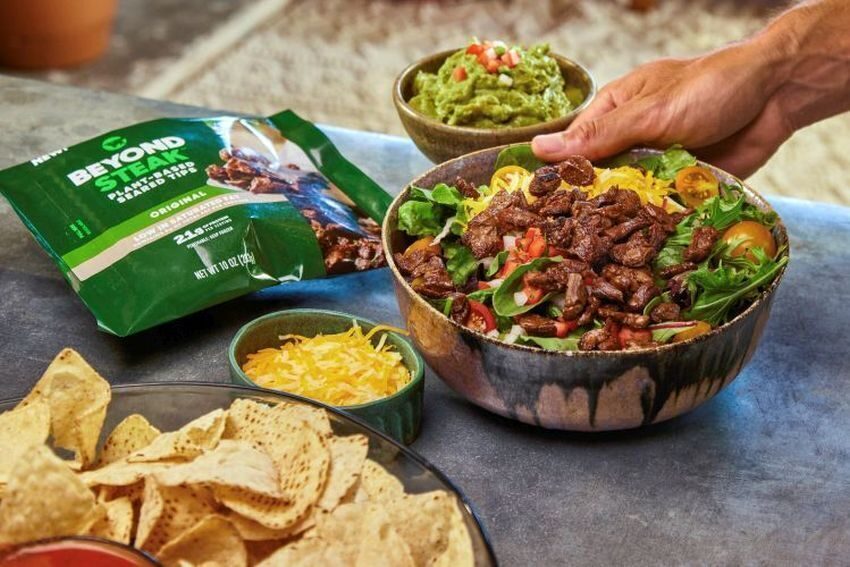Beyond Meat CEO Ethan Brown faced a grilling from analysts Monday afternoon after posting a grim set of second quarter (Q2) results, with a $53.5m net loss, a 30.5% year-over-year decline in net revenues, and a reduced forecast for the full year.
Having previously told the market the firm would achieve cashflow-positive operations in the second half of 2023, the plant-based meat company “now believes this is unlikely to be met in the stated timeframe” in light of “greater than expected consumer and category headwinds and their anticipated impact on net revenues.”
Gross margins, which moved into negative territory last year, were just 2.2% in Q2, down from 6.7% in Q1.
However, sales were up 11% on a quarterly basis, noted Brown, who said his beleaguered firm was finally climbing up the “slope of enlightenment” after sliding into the “trough of disillusionment.”
According to Brown: “While we are reducing our full-year 2023 net revenues outlook, we nevertheless expect a modest return to year-over-year top-line growth in the third and fourth quarters of 2023, and, relative to the first half of 2023, a meaningful reduction in cash consumption and an increase in gross margin.”
Beyond Meat Q2, 2023 by the numbers:
-
- Net revenue: Down 30.5% year over year (YoY)to $102.1 million, but +11% vs previous quarter
- Net loss: $53.5 million
- US retail revenues: Down 38.5% YoY to $48.5 million
- US foodservice revenues: Down 45.4% YoY to $12.8 million
- International retail: Down 15.6% YoY to $20 million
- International foodservice: Down 0.9% YoY to $20.9 million
- Full year 2023 outlook: $360-380 million (in Q1, it had predicted $375-$415 million)
- Balance sheet: As of July 1, Beyond Meat’s cash and cash equivalents balance was $225.9 million and total outstanding debt was $1.1 billion. Read more HERE.
“The main issue with the category is that it is not bringing in enough new consumers. The overall pie is not growing and that’s what we need to fix together with other companies.” Ethan Brown, founder and CEO, Beyond Meat
Ethan Brown: ‘We have been through, I think, what is the most difficult period for the business’
Speaking on the earnings call with analysts, Brown stressed the necessity of replacing animal agriculture in the long-term, but was repeatedly grilled about how he planned to convince US consumers to eat more plant-based meat in the short-term.
If US consumers are still strapped for cash and don’t necessarily see the health or environmental benefits of plant-based meat, said Rob Dickerson, managing director at Jeffries, “Why do you have that conviction [that things will get better]?”
Michael Lavery, senior research analyst at Piper Sandler, meanwhile, wondered how much more quickly product reformulation and continuous improvement work might advance “that might be the difference maker for at least a large percentage of US consumers?”
Ben Theurer at Barclays observed: “It feels like [foodservice in the US] was the area where we expected a lot of growth with some of these announcements in the past with Yum! Brands, McDonald’s and so on. But it kind of feels like it’s not taken off.”
Shrinking to win?
Robert Moskow, food and agribusiness equity analyst with TD Cowen added: “Do you ever consider the possibility that [Beyond Meat] may be a $250- or $300-million business instead of a $350-plus business? Shrinking to win is always a tough strategy, but given what you’re up against here in terms of consumer perception… would you consider right-sizing the company in that direction?”
Brown countered: “I disagree pretty rigorously with that [analysis] if you look at… some of the positive trends that we’re seeing, including the fact that we’re resuming growth quarter over quarter and have been through, I think, what is the most difficult period for the business.”
Europe vs the US: ‘Consumers are very concerned about climate and the environment in Europe’
He went on: “Take Europe, for example, look at our strategic [partners] over there and the progress we’re making. In Germany, we’re selling both burgers and nuggets [at McDonald’s] and doing so with high acceptance among consumers. We also had another launch with McDonald’s in Malta.
“Interestingly enough, a competitor [to McDonald’s]… a large global burger chain, recently shared that one in five of their signature burgers in Germany is now plant-based. And so if you look at … just the overall consumption of animal protein in certain European countries, you can see a very, very strong trend in the right direction.”
He added: “Europe is different than it is here in the United States. Consumers are very concerned about climate and the environment in Europe, government is concerned about it, and institutions are concerned about it. And they see that… changing food is a key way to adapt in the timeframe that we need to get this [under control]… Here in the US, it [plant-based consumption] is more driven by health and there’s been a decline in the health perception of our category… We now have to do the heavy work as an industry to fix that.”
That said, younger consumers in the US understand that what we eat is impacting he climate, he claimed, “While older people aren’t necessarily wrapping their minds around this, younger people are.” By 2025, he noted, 44% of Aramark’s residential dining menus at 250+ US colleges and universities will be plant-based, while Sodexho says 50% of its menus on college campuses will be plant-based by 2025. “So the trend is really is here.”
“The ark of history is very much on the side of what we’re trying to accomplish. And even if all of these other things don’t get cleared up, which they will, around health, etc, you have a climate crisis, which is now becoming more and more real for the consumer. And there is really no way to get at that without fixing food.” Ethan Brown, founder and CEO, Beyond Meat

‘Ambiguity and confusion’ around the health benefits of plant-based meat
While Beyond Meat is looking carefully at price elasticities, aggressive promotional spending to reduce the price gap with conventional meat is not the answer in the US market right now, said Brown. “Doing a lot of continued discounting, whether it’s us or a major competitor, we’re just trading among consumers, so it’s not productive.”
Beyond Meat’s priority, aside from driving efficiencies and continuing to improve its products, is regaining control of the narrative and addressing the “ambiguity and confusion” around the health benefits of plant-based meat, he said.
“There is a considerable gap between the strong health credentials of our products and a broader counter narrative that is now afoot, and this gap appears to have widened. In the two-year period 2020 to 2022, the percentage of US consumers who believe that plant-based meats are healthy dropped from 50 to 38% according to the Food Marketing Institute.
“As was the case during the ascent of plant-based milk, this change in perception is not without encouragement from interest groups, who have succeeded in seeding doubt and fear around the ingredients and processes use to create our and other plant-based meats. Nor is it without contribution from well-meaning yet misguided comparisons of our products to kale salads, versus the animal-based meats they are intended to replace.
“It is in this latter framing that we belong and excel,” said Brown, pointing to Beyond Meat’s new ‘There’s goodness here’ ad campaign. “There’s goodness for the earth given a much lower greenhouse gas, water, land and energy footprint; and goodness for consumers, who can enjoy the dishes they love and are reaping the health benefits of our plant-based meat.”
“If you look at Beyond Steak,” said Brown, “It’s absolutely delicious, you have such high levels of protein and a gram of saturated fat… Those things matter when the consumer is willing to come in. But if there’s a kind of cloud over the sector, those things matter less. So our number one goal is to lift that cloud.
“[We have] clear nutritional advantages including no cholesterol, lower levels of saturated fats, the absence of antibiotics, hormones, and other veterinary drugs, the absence of carcinogenic compounds such as heterocyclic amines and the absence of precursors to TMAO, a compound that researchers have associated with heart disease and certain cancers.”




